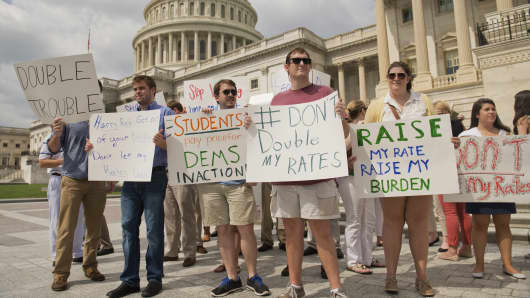The doubling of the interest rate may sound dramatic, but it does not double the loan payments. Most of the loan payment goes to pay down the principal balance of the loan. On a 10-year repayment term, the monthly payment will increase by only about one-sixth, says Mark Kantrowitz, publisher of Edvisors.com, a network of college financial planning and scholarship websites.
(Read More: Senator Gives an 'F' to Student Loan Rate Jump)
What does this doubling in student loan rates mean for the average borrower?
Only about two-fifths of undergraduate students graduate with subsidized Stafford loan debt. The average amount of subsidized Stafford loan debt at graduation is about $9,000 (or $11,000 for those who receive a Bachelor's degree). Based on that amount of loan debt, Kantrowitz calculates the borrower's loan payment will increase by $18 a month on average on a 10-year repayment term (or $24 for a Bachelor's degree recipient.)
Kantrowitz is also the founder of Finaid.org, which has a loan repayment calculator that can you can use to figure out your monthly payment on federal and most private student loans.
Do I have to make these increased payments immediately?
Most new borrowers will not receive subsidized federal Stafford loans until the fall, so they will not see the increase until then -- and the real impact on their wallets will come even later. The rate increase only affects a student once he or she leaves school. No interest is charged on a subsidized Stafford loan while the student is enrolled in college. So borrowers won't have to make the increased monthly payments on these loans until after graduation day.
Could rates come down if Congress decides to act later this summer?
Certainly Congress could make a change to lower interest rates and make it retroactive to July 1. But a retroactive change would only apply to those loans that have not yet been disbursed by the U.S. Department of Education.
(Read More:Introducing the Finance Whizzes of Tomorrow)
Last year Congress passed two laws to implement a one-year extension to the 3.4 percent interest rate. The first law authorized the Education Department to delay disbursements on subsidized Stafford loans to July 6, 2012. The second law, which was enacted on July 6, implemented the extension to the 3.4 percent interest rate. However, policymakers are still far apart on key issues, such as whether there should be a cap on the interest rates. A retroactive change in rates may be unlikely.
—By CNBC's Sharon Epperson. Follow her on Twitter @sharon_epperson





